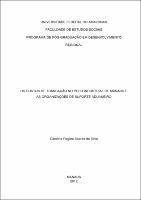| ???jsp.display-item.social.title??? |


|
Please use this identifier to cite or link to this item:
https://tede.ufam.edu.br/handle/tede/2469Full metadata record
| DC Field | Value | Language |
|---|---|---|
| dc.creator | Silva, Caroline Regina Soares da | - |
| dc.creator.Lattes | http://lattes.cnpq.br/4706434032415108 | por |
| dc.contributor.advisor1 | Nascimento, Luiz Roberto Coelho | - |
| dc.contributor.advisor1Lattes | http://lattes.cnpq.br/5393962026502758 | por |
| dc.date.available | 2015-04-08 | - |
| dc.date.issued | 2012-04-23 | - |
| dc.identifier.citation | SILVA, Caroline Regina Soares da. Os custos de transação no Polo Industrial de Manaus e as organizações de suporte aduaneiro. 2012. 103 f. Dissertação (Mestrado em Desenvolvimento Regional) - Universidade Federal do Amazonas, Manaus, 2012. | por |
| dc.identifier.uri | http://tede.ufam.edu.br/handle/tede/2469 | - |
| dc.description.resumo | Um dos grandes desafios do Amazonas é tentar reduzir os custos de transação incorridos pelas empresas quando estas vão ao mercado demandar serviços aduaneiros, isso porque este tipo de atividade produz impacto significativo na competitividade dos produtos do PIM. Assim, este estudo visa identificar e compreender as razões institucionais que não promovem celeridade no atendimento das demandas por serviços aduaneiros e fiscais no âmbito da economia de Manaus. A hipótese básica estabelece que o fator relacionado à burocracia sobrepõe-se ao infraestrutural. Especificamente, pretende-se: a) Identificar os principais fatores que influenciam o tempo de desembaraço de mercadorias no sistema aeroportuário; b) Identificar os principais fatores que influenciam o tempo de desembaraço de mercadorias no sistema portuário. O marco conceitual deste estudo assenta-se nos conceitos de Custos de Transação, Instituições e Crescimento Econômico, enfatizando que existem custos, além dos envolvidos diretamente com a produção, que influenciam na formação do custo total dos produtos, como excessiva carga tributária, processos burocráticos, corrupção, lacunas de infraestrutura, dentre outros ESPINO (1999). O método denominado Análise de Fatorial foi utilizado para sumarizar as variáveis tomadas para explicar o tempo necessário para desembaraço de mercadorias, agrupando-as em fatores. Conclui-se que no sistema aeroportuário os fatores que mais influenciam este tempo são o atendimento prestado pelos servidores e a burocracia dos órgãos intervenientes. Por outro lado, no sistema portuário, refutando a hipótese deste trabalho, a infraestrutura colocou-se como fator mais influenciador do tempo necessário à execução dos serviços aduaneiros. | por |
| dc.description.abstract | One of the great challenges of the Amazon is trying to reduce the transaction costs incurred by companies when they go to market demand customs services, that because this type of activity produces significant impact on the competitiveness of the products of PIM. Thus, this study aims to identify and understand the institutional reasons that do not promote celerity in attendance the demands for customs services and tax services within the economy of Manaus. The basic hypothesis states that the factor related to bureaucracy overlaps the infrastructural. Specifically, we intend to: a) Identify the main factors that influence the time of clearance of goods at the airport system; b) Identify the main factors that influence the time of clearance of goods at the port system. The conceptual framework of this study is based on the concepts of Transaction Costs, Institutions and Economic Growth, emphasizing that "there are costs in addition to the directly involved with the production, which influence the formation of the total cost of the product, such as excessive tax burden, processes bureaucratic corruption, gaps in infrastructure, among others "ESPINO (1999). The method known as Factorial Analysis was used to summarize the variable taken to account for the time required for clearance of goods, grouping them into factors. We conclude that the factors that influence this time in the airport system are the care provided by servers and bureaucracy of the intervening agencies. On the other hand, at the port system, refuting the hypothesis of this work, the infrastructure put up more as a factor influencing the time needed for implementation of customs services. | eng |
| dc.description.sponsorship | CAPES - Coordenação de Aperfeiçoamento de Pessoal de Nível Superior | - |
| dc.format | application/pdf | por |
| dc.thumbnail.url | http://200.129.163.131:8080//retrieve/10827/Disserta%c3%a7%c3%a3o%20-%20Caroline%20Regina%20Soares%20da%20Silva.pdf.jpg | * |
| dc.language | por | por |
| dc.publisher | Universidade Federal do Amazonas | por |
| dc.publisher.department | Faculdade de Estudos Sociais | por |
| dc.publisher.country | BR | por |
| dc.publisher.initials | UFAM | por |
| dc.publisher.program | Programa de Pós-Graduação em Desenvolvimento Regional | por |
| dc.rights | Acesso Aberto | por |
| dc.subject | Política aduaneira | por |
| dc.subject | Portos - Infraestrutura | por |
| dc.subject | Crescimento Econômico - Manaus | por |
| dc.subject | Sistemas aeroportuário - Manaus | por |
| dc.subject | Transaction Costs | eng |
| dc.subject | Economic Growth | eng |
| dc.subject | Ports and Airports | eng |
| dc.subject.cnpq | CIÊNCIAS SOCIAIS APLICADAS | por |
| dc.title | Os custos de transação no Polo Industrial de Manaus e as organizações de suporte aduaneiro | por |
| dc.type | Dissertação | por |
| Appears in Collections: | Mestrado em Desenvolvimento Regional | |
Files in This Item:
| File | Description | Size | Format | |
|---|---|---|---|---|
| Dissertação - Caroline Regina Soares da Silva.pdf | Dissertação - Caroline Regina Soares da Silva.pdf | 1.02 MB | Adobe PDF |  Download/Open Preview |
Items in DSpace are protected by copyright, with all rights reserved, unless otherwise indicated.




